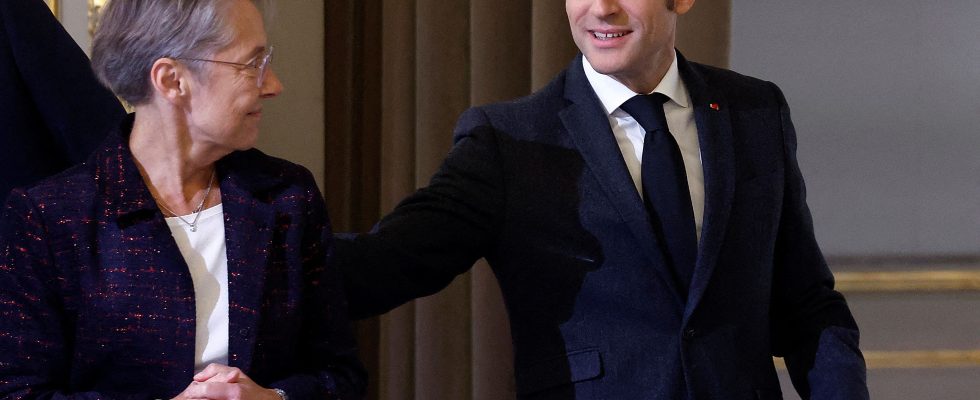Some have called for his departure, admittedly not from day one, but from the first month. In the aftermath of the second round of the legislative elections of June 2022, Elisabeth Borne had saved her place by fighting to win the majority and convince Emmanuel Macron that she could do it. Conclusive trial period: his lease was extended to Matignon. The Prime Minister is therefore not the least well placed when she considers having a CDD.
On Wednesday, things changed: the pressure came from his direct superior. “I hope she will succeed,” said Emmanuel Macron after asking him to build a government program and expand the majority. We have experienced warmer support. Elisabeth Borne does not want to see any malicious intention in the remarks, she does not imagine the president starting a television program with sentences prepared in advance, she is mistaken or pretends not to decode the message: these words do not owe anything randomly.
The Elysian desire to distance itself from the head of government was too obvious to go unnoticed. But it is shifted, almost outdated. Is Elisabeth Borne still the “fuse” that she said she accepted to be in a meeting, while the person of Emmanuel Macron now concentrates all the disputes, tensions, hatred?
If her fate does not depend on her, the Prime Minister is trying to resume the march forward. “The objective is obviously to appease,” she confides the day after a successful day of demonstrations and, new fact, an evening of riots. Matignon does not think that the use of 49.3 has added fuel to the fire, which remains to be proven. In 2006, the protest movement against the CPE was running out of steam and had just experienced its first failure in terms of mobilization in the street, and it was Dominique de Villepin’s use of 49.3 which revived the protest, until the abandonment of the text.
Contact restored with Berger
Obviously, in recent hours, the climate has changed. After a period of silence, Elisabeth Borne re-established, after the vote in the National Assembly, contact with Laurent Berger – who wanted “a break” in the reform this Friday, March 24 – and with the inter-union, because the two parties share at least one thing: concern about the turn of events. She wants to believe in the common interest of relaunching the discussion, including officially. At the same time, Emmanuel Macron said, at a press conference in Brussels, “at the disposal of the inter-union” to talk, roughly speaking, about everything except pensions.
But Elisabeth Borne knows it from experience, she who managed the movement of truckers as Minister of Transport: there are times when one is inaudible. While waiting for the Constitutional Council to rule, it tries to move away from the incandescence of the moment: to put work back at the heart of exchanges, to take care of school, health. Since the texts were voted smoothly before the retreats (with the exception of the financial bills), let’s start again. Shorter, simpler texts, is this the guarantee of fewer problems? And now that there is no more immigration bill, it should be possible to put 49.3 back in a double-locked drawer.
With an “enlarged” majority? With a restored majority, the Prime Minister would almost want to respond. She does not pay for words, convinced that deporting to the right would lead to losses on the side of the left of the majority. The coalition, she never believed in it, and no more today than yesterday. She will again receive the presidents of parliamentary groups “of good will”, as Emmanuel Macron would say, to try to clear a path.
The sequence of retreats will leave traces
But the episode of pensions is not one of those parentheses that are easily closed. The sequence will leave traces, in the country, in the majority and even in relations at the top of the state. Elisabeth Borne thought that the conclusive Mixed Joint Commission would create a dynamic favorable to the text on pensions, it was quite the opposite. Two days before resorting to 49.3, she called right-wing regional presidents to help her convince deputies. Except that by dint of receiving phone calls, they eventually got tired. “She believed until the end that the deal with LR was going to hold”, remarks the Elysée – the reproach is not far away. In the end, the question arises: whose fault is it? Error of analysis of the Prime Minister? Or decline of the right-wing party? On Sunday, Elisabeth Borne still speaks with Eric Ciotti: between five and ten LR votes will vote for censorship, estimates the party president. They will be 19. Thunderbolt on the political landscape.
“Bruno Le Maire is unfolding, have you noticed?” Laughs a close friend of the Head of State. May a hundred flowers bloom, as a Maoist macronist would say (the latter do not constitute the majority of the species, let’s agree). The names of Sébastien Lecornu, Julien Denormandie, Richard Ferrand, Gabriel Attal begin to be whispered. But politics is a matter of balance of power before being a story of imagination. “If we change Prime Minister at the moment, we do not change the balance of power in the National Assembly”, notes an adviser to the executive. The disorder is such that a cat would not find her young there. The president of the Les Républicains group, Olivier Marleix, assured a friend: “Even Nicolas Sarkozy appointed to Matignon would not bring more than ten LR deputies into the ranks of the majority.”
It would take more for the ball of suitors does not resume more beautiful. Elisabeth Borne watches him out of the corner of her eye. One would then believe to hear Edouard Philippe who was amused to see some of his visitors taking the measurements of the office at the same time as they came to give him some necessarily disinterested advice. Friends of course. A prime minister always has friends.
